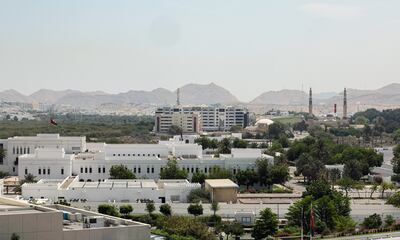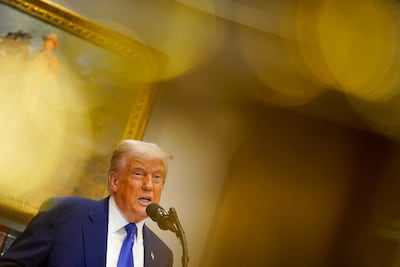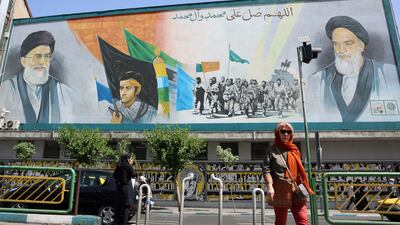Talks between the US and Iran over Tehran's nuclear programme are stumbling over disagreements on uranium enrichment, according to two senior Iranian officials.
İran has "not accepted" an invitation put forward by mediator Oman for a fifth round of talks due to take place in Rome this Friday, one official said, after the US negotiator Steve Witkoff said enrichment would not be allowed under any deal. Enrichment is “one very, very clear red line” for the Trump administration, Mr Witkoff said on Monday,
His comments left officials in Iran uncertain about the usefulness of more talks. Tehran wants to retain the right to enrichment under any deal for what officials describe as its "peaceful nuclear programme" for scientific and agricultural purposes.
İran "does not want to have another round of talks and them to fail", the official said, speaking on condition of anonymity. "With zero enrichment, we don't have a deal,” he added. “But if the goal is no nuclear weapons, we can have a deal.”
Inside the talks
The National obtained a rare press visa for Iran to attend a conference organised by Iran's Ministry of Foreign Affairs. Officials in Tehran gave some of the most detailed outlines yet on its position in the continuing talks.
The officials described negotiations, which are solely focused on nuclear activity and do not extend to other issues such as Iran's ballistic missile capacities or regional policies, as "respectful" so far. But there was a "serious problem" with the US insistence on zero enrichment, one of the officials said, and Iranians have been frustrated by what they see as ambitious and inconsistent positions from Washington.
The US has "resorted to threats and new sanctions,” the second official said. “This has clouded the atmosphere of the talks.”
On a tour of Gulf countries last week, the US President Donald Trump called on "nations of conscience" to isolate Iran until it is a "willing partner for peace".
Oman, which is mediating the talks, has suggested "positive points" that could help to move talks forward from the current impasse, the first official said. If the Iranian delegation goes to Rome this Friday, "I hope the situation will be different and move forward," he added.
The four rounds of talks so far have been "mostly indirect", said one of the officials, who gave "pressure" in the form of US sanctions and military build-up in the Middle East as reasons for not talking directly.
Red lines
While İran rejects an outright ban on enrichment, it is open to negotiations over the scale and locations of the country's nuclear activities, suggesting that it could accept some limitations on the percentage to which it enriches uranium in exchange for sanctions relief. "The number of machines, the level, locations are negotiable, in exchange for termination of sanctions," one of the officials said.
Since the first Trump administration pulled out of a previous nuclear deal between İran and world powers, Tehran has enriched uranium to 60 per cent, according to the International Atomic Energy Agency in Vienna. That is one step away from the 90 per cent enrichment needed for a nuclear weapon.
Any new deal should follow the same logic as the previous deal, Iran says, although it is aware that neither side believes it ideal. Mr Trump left the deal (officially known as the Joint Comprehensive Plan of Action) in 2018, calling it "the worst deal in history".
"We know you don't like the JCPOA, and we don't like it any more either," was how one of the officials described Iran's message to the US in their first meeting, which took place last month in the capital of Oman, Muscat. "But we believe its logic is still valid – build confidence and transparency on our peaceful nuclear programme in exchange for sanctions relief."
Talks have not reached the point of working out the granular detail of what easing those restrictions might look like. Tehran says it first wants to establish the US negotiating position around enrichment.
"We haven't got there yet [in negotiations]," one of the officials said. "First we are trying to understand what the US position is. If they insist on zero enrichment, then we are not going to make a deal. If we can continue to negotiate a deal, then afterwards we will work out how sanctions would be lifted, whether step by step or altogether."
Iran hawks in the US and Israel are against a deal, and want the total elimination of Iran's nuclear programme. İran is aware of pressure on US negotiators from parties that oppose a nuclear deal between the two countries. "But that is not my problem," one of the officials said.
At the same time, Iran says it is keen to continue diplomacy to reach a solution. "We do understand that it should be a win-win game," the official said. "We don't have a problem with the other side claiming victory after negotiations, just as we can claim victory."
Where to buy
Limited-edition art prints of The Sofa Series: Sultani can be acquired from Reem El Mutwalli at www.reemelmutwalli.com
Moral education needed in a 'rapidly changing world'
Moral education lessons for young people is needed in a rapidly changing world, the head of the programme said.
Alanood Al Kaabi, head of programmes at the Education Affairs Office of the Crown Price Court - Abu Dhabi, said: "The Crown Price Court is fully behind this initiative and have already seen the curriculum succeed in empowering young people and providing them with the necessary tools to succeed in building the future of the nation at all levels.
"Moral education touches on every aspect and subject that children engage in.
"It is not just limited to science or maths but it is involved in all subjects and it is helping children to adapt to integral moral practises.
"The moral education programme has been designed to develop children holistically in a world being rapidly transformed by technology and globalisation."
UAE currency: the story behind the money in your pockets
AWARDS
%3Cp%3E%3Cstrong%3EBest%20Male%20black%20belt%3A%20%3C%2Fstrong%3ELucas%20Protasio%20(BRA)%3Cbr%3E%3Cstrong%3EBest%20female%20black%20belt%3A%20%3C%2Fstrong%3EJulia%20Alves%20(BRA)%3Cbr%3E%3Cstrong%3EBest%20Masters%20black%20belt%3A%3C%2Fstrong%3E%20Igor%20Silva%20(BRA)%3Cbr%3E%3Cstrong%3EBest%20Asian%20Jiu-Jitsu%20Federation%3A%3C%2Fstrong%3E%20Kazakhstan%3Cbr%3E%3Cstrong%3EBest%20Academy%20in%20UAE%3A%20%3C%2Fstrong%3ECommando%20Group%2C%20Abu%20Dhabi%3Cbr%3E%3Cstrong%3EBest%20International%20Academy%3A%3C%2Fstrong%3E%20Commando%20Group%2C%20Abu%20Dhabi%3Cbr%3E%3Cstrong%3EAfrican%20Player%20of%20the%20Year%3A%20%3C%2Fstrong%3EKatiuscia%20Yasmira%20Dias%20(GNB)%3Cbr%3E%3Cstrong%3EOceanian%20Player%20of%20the%20Year%3A%20%3C%2Fstrong%3EAnton%20Minenko%20(AUS)%3Cbr%3E%3Cstrong%3EEuropean%20Player%20of%20the%20Year%3A%3C%2Fstrong%3E%20Rose%20El%20Sharouni%20(NED)%3Cbr%3E%3Cstrong%3ENorth%20and%20Central%20American%20Player%20of%20the%20Year%3A%20%3C%2Fstrong%3EAlexa%20Yanes%20(USA)%3Cbr%3E%3Cstrong%3EAsian%20Player%20of%20the%20Year%3A%20%3C%2Fstrong%3EZayed%20Al%20Katheeri%20(UAE)%3Cbr%3E%3Cstrong%3ERookie%20of%20the%20Year%3A%3C%2Fstrong%3E%20Rui%20Neto%20(BRA)Rui%20Neto%20(BRA)%3C%2Fp%3E%0A
Killing of Qassem Suleimani
Company: Instabug
Founded: 2013
Based: Egypt, Cairo
Sector: IT
Employees: 100
Stage: Series A
Investors: Flat6Labs, Accel, Y Combinator and angel investors
SPEC%20SHEET%3A%20APPLE%20M3%20MACBOOK%20AIR%20(13%22)
%3Cp%3E%3Cstrong%3EProcessor%3A%3C%2Fstrong%3E%20Apple%20M3%2C%208-core%20CPU%2C%20up%20to%2010-core%20CPU%2C%2016-core%20Neural%20Engine%3C%2Fp%3E%0A%3Cp%3E%3Cstrong%3EDisplay%3A%3C%2Fstrong%3E%2013.6-inch%20Liquid%20Retina%2C%202560%20x%201664%2C%20224ppi%2C%20500%20nits%2C%20True%20Tone%2C%20wide%20colour%3C%2Fp%3E%0A%3Cp%3E%3Cstrong%3EMemory%3A%3C%2Fstrong%3E%208%2F16%2F24GB%3C%2Fp%3E%0A%3Cp%3E%3Cstrong%3EStorage%3A%3C%2Fstrong%3E%20256%2F512GB%20%2F%201%2F2TB%3C%2Fp%3E%0A%3Cp%3E%3Cstrong%3EI%2FO%3A%3C%2Fstrong%3E%20Thunderbolt%203%2FUSB-4%20(2)%2C%203.5mm%20audio%2C%20Touch%20ID%3C%2Fp%3E%0A%3Cp%3E%3Cstrong%3EConnectivity%3A%3C%2Fstrong%3E%20Wi-Fi%206E%2C%20Bluetooth%205.3%3C%2Fp%3E%0A%3Cp%3E%3Cstrong%3EBattery%3A%3C%2Fstrong%3E%2052.6Wh%20lithium-polymer%2C%20up%20to%2018%20hours%2C%20MagSafe%20charging%3C%2Fp%3E%0A%3Cp%3E%3Cstrong%3ECamera%3A%3C%2Fstrong%3E%201080p%20FaceTime%20HD%3C%2Fp%3E%0A%3Cp%3E%3Cstrong%3EVideo%3A%3C%2Fstrong%3E%20Support%20for%20Apple%20ProRes%2C%20HDR%20with%20Dolby%20Vision%2C%20HDR10%3C%2Fp%3E%0A%3Cp%3E%3Cstrong%3EAudio%3A%3C%2Fstrong%3E%204-speaker%20system%2C%20wide%20stereo%2C%20support%20for%20Dolby%20Atmos%2C%20Spatial%20Audio%20and%20dynamic%20head%20tracking%20(with%20AirPods)%3C%2Fp%3E%0A%3Cp%3E%3Cstrong%3EColours%3A%3C%2Fstrong%3E%20Midnight%2C%20silver%2C%20space%20grey%2C%20starlight%3C%2Fp%3E%0A%3Cp%3E%3Cstrong%3EIn%20the%20box%3A%3C%2Fstrong%3E%20MacBook%20Air%2C%2030W%2F35W%20dual-port%2F70w%20power%20adapter%2C%20USB-C-to-MagSafe%20cable%2C%202%20Apple%20stickers%3C%2Fp%3E%0A%3Cp%3E%3Cstrong%3EPrice%3A%3C%2Fstrong%3E%20From%20Dh4%2C599%3C%2Fp%3E%0A
Company%20Profile
%3Cp%3E%3Cstrong%3ECompany%20name%3A%3C%2Fstrong%3E%20myZoi%3Cbr%3E%3Cstrong%3EStarted%3A%3C%2Fstrong%3E%202021%3Cbr%3E%3Cstrong%3EFounders%3A%3C%2Fstrong%3E%20Syed%20Ali%2C%20Christian%20Buchholz%2C%20Shanawaz%20Rouf%2C%20Arsalan%20Siddiqui%2C%20Nabid%20Hassan%3Cbr%3E%3Cstrong%3EBased%3A%3C%2Fstrong%3E%20UAE%3Cbr%3E%3Cstrong%3ENumber%20of%20staff%3A%3C%2Fstrong%3E%2037%3Cbr%3E%3Cstrong%3EInvestment%3A%3C%2Fstrong%3E%20Initial%20undisclosed%20funding%20from%20SC%20Ventures%3B%20second%20round%20of%20funding%20totalling%20%2414%20million%20from%20a%20consortium%20of%20SBI%2C%20a%20Japanese%20VC%20firm%2C%20and%20SC%20Venture%3C%2Fp%3E%0A
Test squad: Azhar Ali (captain), Abid Ali, Asad Shafiq, Babar Azam, Haris Sohail, Imam-ul-Haq, Imran Khan, Iftikhar Ahmed, Kashif Bhatti, Mohammad Abbas, Mohammad Rizwan(wicketkeeper), Musa Khan, Naseem Shah, Shaheen Afridi, Shan Masood, Yasir Shah
Twenty20 squad: Babar Azam (captain), Asif Ali, Fakhar Zaman, Haris Sohail, Iftikhar Ahmed, Imad Wasim, Imam-ul-Haq, Khushdil Shah, Mohammad Amir, Mohammad Hasnain, Mohammad Irfan, Mohammad Rizwan (wicketkeeper), Musa Khan, Shadab Khan, Usman Qadir, Wahab Riaz
Fifa Club World Cup quarter-final
Kashima Antlers 3 (Nagaki 49’, Serginho 69’, Abe 84’)
Guadalajara 2 (Zaldivar 03’, Pulido 90')
Read more about the coronavirus
The specs
Engine: 2.0-litre 4-cyl turbo
Power: 247hp at 6,500rpm
Torque: 370Nm from 1,500-3,500rpm
Transmission: 10-speed auto
Fuel consumption: 7.8L/100km
Price: from Dh94,900
On sale: now
ABU%20DHABI'S%20KEY%20TOURISM%20GOALS%3A%20BY%20THE%20NUMBERS
%3Cp%3EBy%202030%2C%20Abu%20Dhabi%20aims%20to%20achieve%3A%3C%2Fp%3E%0A%3Cp%3E%3Cstrong%3E%E2%80%A2%2039.3%20million%20visitors%2C%3C%2Fstrong%3E%20nearly%2064%25%20up%20from%202023%3C%2Fp%3E%0A%3Cp%3E%3Cstrong%3E%E2%80%A2%20Dh90%20billion%20contribution%20to%20GDP%2C%3C%2Fstrong%3E%20about%2084%25%20more%20than%20Dh49%20billion%20in%202023%3C%2Fp%3E%0A%3Cp%3E%3Cstrong%3E%E2%80%A2%20178%2C000%20new%20jobs%2C%3C%2Fstrong%3E%20bringing%20the%20total%20to%20about%20366%2C000%3C%2Fp%3E%0A%3Cp%3E%3Cstrong%3E%E2%80%A2%2052%2C000%20hotel%20rooms%2C%3C%2Fstrong%3E%20up%2053%25%20from%2034%2C000%20in%202023%3C%2Fp%3E%0A%3Cp%3E%3Cstrong%3E%E2%80%A2%207.2%20million%20international%20visitors%2C%3C%2Fstrong%3E%20almost%2090%25%20higher%20compared%20to%202023's%203.8%20million%3C%2Fp%3E%0A%3Cp%3E%3Cstrong%3E%E2%80%A2%203.9%20international%20overnight%20hotel%20stays%2C%3C%2Fstrong%3E%2022%25%20more%20from%203.2%20nights%20in%202023%3C%2Fp%3E%0A
Turkish Ladies
Various artists, Sony Music Turkey
RESULTS
1.45pm: Maiden Dh75,000 1,400m
Winner: Dirilis Ertugrul, Fabrice Veron (jockey), Ismail Mohammed (trainer)
2.15pm: Handicap Dh90,000 1,400m
Winner: Kidd Malibu, Sandro Paiva, Musabah Al Muhairi
2.45pm: Maiden Dh75,000 1,000m
Winner: Raakezz, Tadhg O’Shea, Nicholas Bachalard
3.15pm: Handicap Dh105,000 1,200m
Winner: Au Couer, Sean Kirrane, Satish Seemar
3.45pm: Maiden Dh75,000 1,600m
Winner: Rayig, Pat Dobbs, Doug Watson
4.15pm: Handicap Dh105,000 1,600m
Winner: Chiefdom, Royston Ffrench, Salem bin Ghadayer
4.45pm: Handicap Dh80,000 1,800m
Winner: King’s Shadow, Richard Mullen, Satish Seemar
In numbers: PKK’s money network in Europe
Germany: PKK collectors typically bring in $18 million in cash a year – amount has trebled since 2010
Revolutionary tax: Investigators say about $2 million a year raised from ‘tax collection’ around Marseille
Extortion: Gunman convicted in 2023 of demanding $10,000 from Kurdish businessman in Stockholm
Drug trade: PKK income claimed by Turkish anti-drugs force in 2024 to be as high as $500 million a year
Denmark: PKK one of two terrorist groups along with Iranian separatists ASMLA to raise “two-digit million amounts”
Contributions: Hundreds of euros expected from typical Kurdish families and thousands from business owners
TV channel: Kurdish Roj TV accounts frozen and went bankrupt after Denmark fined it more than $1 million over PKK links in 2013
Groom and Two Brides
Director: Elie Semaan
Starring: Abdullah Boushehri, Laila Abdallah, Lulwa Almulla
Rating: 3/5
New schools in Dubai
PREMIER LEAGUE RESULTS
Bournemouth 1 Manchester City 2
Watford 0 Brighton and Hove Albion 0
Newcastle United 3 West Ham United 0
Huddersfield Town 0 Southampton 0
Crystal Palace 0 Swansea City 2
Manchester United 2 Leicester City 0
West Bromwich Albion 1 Stoke City 1
Chelsea 2 Everton 0
Tottenham Hotspur 1 Burnley 1
Liverpool 4 Arsenal 0
ASSASSIN'S%20CREED%20MIRAGE
%3Cp%3E%0DDeveloper%3A%20Ubisoft%20Bordeaux%0D%3Cbr%3EPublisher%3A%20Ubisoft%0D%3Cbr%3EConsoles%3A%20PlayStation%204%26amp%3B5%2C%20PC%20and%20Xbox%20Series%20S%26amp%3BX%0D%3Cbr%3ERating%3A%203.5%2F5%3C%2Fp%3E%0A
The specs
Engine: 3.0-litre six-cylinder MHEV
Power: 360bhp
Torque: 500Nm
Transmission: eight-speed automatic
Price: from Dh282,870
On sale: now
More on animal trafficking
The specs
Engine: 6.2-litre V8
Transmission: seven-speed auto
Power: 420 bhp
Torque: 624Nm
Price: from Dh293,200
On sale: now
The five pillars of Islam
1. Fasting
2. Prayer
3. Hajj
4. Shahada
5. Zakat
PROFILE
Name: Enhance Fitness
Year started: 2018
Based: UAE
Employees: 200
Amount raised: $3m
Investors: Global Ventures and angel investors
The specs: 2019 BMW X4
Price, base / as tested: Dh276,675 / Dh346,800
Engine: 3.0-litre turbocharged in-line six-cylinder
Transmission: Eight-speed automatic
Power: 354hp @ 5,500rpm
Torque: 500Nm @ 1,550rpm
Fuel economy, combined: 9.0L / 100km
Lexus LX700h specs
Engine: 3.4-litre twin-turbo V6 plus supplementary electric motor
Power: 464hp at 5,200rpm
Torque: 790Nm from 2,000-3,600rpm
Transmission: 10-speed auto
Fuel consumption: 11.7L/100km
On sale: Now
Price: From Dh590,000






